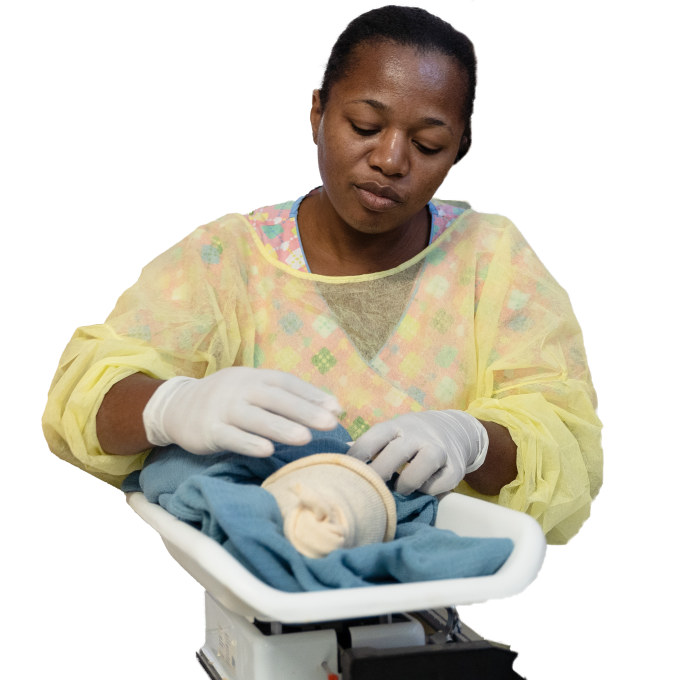“I never tire of providing care, so that mothers can experience the joy of holding a healthy baby again.”
Your donation will help Nurse Pascale save lives in our NICU.

This is a statistic that hounds Haiti. More than just a number recorded for world tallies, it represents thousands of women who die needlessly in childbirth, and newborn babies who don’t survive their first days of life—nearly all because they could not get access to quality medical care when they most needed it.
At SBH, women and newborns come from across Haiti’s southern peninsula to receive critical maternal and neonatal care. Before our Neonatal intensive care unit (NICU), women and their babies would have to travel to Port au Prince to get this level of care—and many were denied because they could not pay high fees, or they wait for care was too long.
With the recent closure of one of Port au Prince’s few free emergency obstetric clinics, access to critical care for women and newborns is even more limited. SBH stands as one of the few beacons of hope for reducing the rates of maternal and neonatal deaths.
Hear first hand about the impact of being able to get this kind of care, from some of the women whose babies are in our NICU.
I am so happy to see my baby breathing well.
Rosèlene Deonette
Rosèlene lives in Bainet, a town on the southern coast of Haiti about 2.5 hours from SBH. She gave birth to her first child at home, without prenatal care or a trained birthing assistant, and sadly the baby died soon after birth. For her second child, she knew she wanted to give birth in a medical facility, so she got prenatal care at the Villa Clinic, about an hour from her home, and then went there when she went into labor. Her son had trouble breathing when he was born. The Villa Clinic’s staff did emergency protocols to help him through the critical first few minutes of life but knew he needed more intensive ongoing care, so he and Rosèlene were rushed to our NICU. “I was so scared when the clinic staff was working to make my baby breathe, but I knew we were in good hands. Now that he is at St. Boniface and getting the care he needs he is doing so much better, and I’m so happy to see him breathing well!”
I had a complicated pregnancy and gave birth more than two months early. Thankfully I came here, and my baby is doing well in the NICU.
Ogenie Jean-Denie
Ogenie lives in Camperin, in the mountains north of Les Cayes. Because she got a prenatal exam early in her pregnancy, she knew she was at high risk for complications and premature birth. She came to Kay Fanm Ansent, our Maternal Waiting Home a week before giving birth when she started getting early labor pains. After keeping her under observation for a week the Maternity Center team could no longer delay her labor, and Ogenie gave birth to a small but strong baby who is currently under care at the NICU while he grows.
She needed more advanced care, so we were referred here to St. Boniface because they are the only ones who can provide the care she needs.
Marise Clerge
Marise gave birth to her second baby at a clinic near her home in Port-a-Piment, on Haiti’s far southwest coast. Port-a-Piment was hit hard by Hurricane Matthew in late 2016, and the clinic there can only provide basic primary and birthing care. Because Marise’s baby was born prematurely and was struggling after birth, the clinic referred her to our NICU for more intensive treatment than they could provide.
The services at St. Boniface Hospital are excellent. I am so grateful I could receive this kind of care at no cost.
Anne Lebrun
As a first-time mother with a high-risk pregnancy, being able to get high-quality care during pregnancy, birth, and for her baby’s first days and weeks of life made a potentially life-saving difference for Anne Lebrun. Though she lives only an hour away—relatively close compared to many of her fellow moms in the NICU—Anne spent the last month of her pregnancy at Kay Fanm Ansent in Fond des Blancs so that she could be closely monitored and brought to the hospital immediately at the first sign of complications. Because of her high-risk status, Anne delivered via c-Section at our surgical center, and her baby was brought directly to the NICU for care. Happily, both mom and baby are doing well, and are looking forward to going home soon.
Not all stories are as happy as Rosèlene’s, Ogenie’s, Marise’s, and Anne’s.
Solove is another mother currently at the NICU, whose first baby died after she gave birth at home. When she got pregnant again, after her first child’s tragic death, she instinctively knew something was different about this pregnancy. At her local clinic, which has minimal equipment and supplies, and only a few staff, they told her she was carrying twins. The clinic referred her to SBH to give birth, concerned that if anything went wrong during the delivery they would not have the capacity to provide the care she needed. So, when Solove started going into premature labor she rushed to the hospital, where she soon learned it was not twins, but triplets! Sadly, one of the three babies did not survive birth. But Solove’s two surviving babies are getting the intensive care that they need now to survive and hopefully thrive.
To support the work of the our NICU, and all of the life-saving services that our staff provides for hundreds of people every day, please visit click here to learn how you can get more involved.
Your donation will help Nurse Pascale save lives in our NICU.
